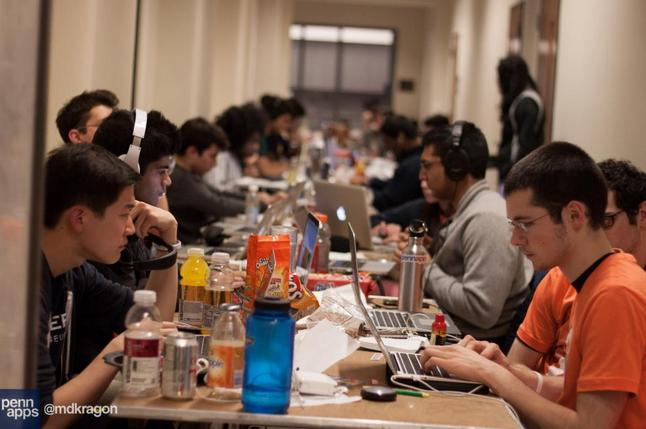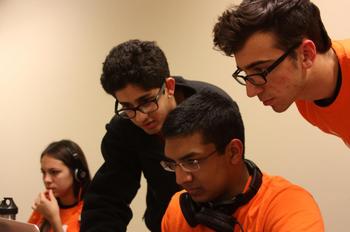
Michigan Hackers compete at the PennApps Hackathon in Philadelphia earlier in January. Michigan hackers placed a number of teams in the Top 20 including the top audio hack at the competition.
Photo courtesy Jack Wink
The MHacks Hackathon, presented by student groups Michigan Hackers and MPowered, will attract 500 students from across the country to Palmer Commons where they will “hack” for 32 straight hours on Feb. 1-3.
The marathon coding sessions, which have been gaining popularity in the technology world since the mid-2000s, aim to put pressure on developers that can produce new and exciting innovations.
Get Ann Arbor news in your inbox
Keep your finger on the pulse of the Ann Arbor business community by signing up for the Business Review newsletter sent out early every Thursday morning. You can also sign up for the daily 3@3 email to see our best local stories every day.
“You could give most coders a month to build something, and most times they wouldn’t have anything at the end of the month. At a hackathon there are all these forces, this field, this energy that pushes hackers to the next level, and a lot of them actually end up building something really complete.”
Fontenot, a sophomore computer science student, has traveled across the country to hackathons at different universities. He was one of 47 University of Michigan students who went to Philadelphia for the PennApps hackathon Jan. 18-20. Competing at top schools allowed him to see how much potential Michigan had to be a national leader in computer science development.
“The hacker community is really sweeping over the school, and especially the computer science department right now,” he said.
“We were the second biggest group at PennApps this year after UPenn. We had as many teams in the top 20 as Penn did and they had over 200 participants.”
At the events, hackers build everything from websites, to mobile apps, to innovative hardware. Fontenot and fellow sophomore Raj Vir have built humorous websites at hackathons including buddymeme.com and hackmyfacebook.com. Others have built more practical applications.
“A Michigan team at PennApps last year built a mobile app called ‘Perimeter’ that is now a real company in TechArb,” Vir said.
“They built a home automation software that can do things like turn on your lights when you walk into your house, all based on your phone’s geolocation. And they built that their first time ever at a hackathon.”
Seeing the success of Michigan innovations at other school’s hackathon’s, the next step for Fontenot was to bring the energy that he felt at these events back home.
“Rather than the talent leaving the state we want to bring students from across the country to Michigan,” he said.

Raj Vir (standing left) and David Fontenot (standing right) look at their teammates code at the PennApps competition.
Photo courtesy Shiva Kilaru
Major student hackathons have traditionally been hosted by coastal schools, and the enthusiasm shown by schools in Illinois and Indiana for a competition closer to home has been overwhelming for Fontenot.
“University of Illinois at Urbana Champaign has already signed up over 100 people, that’s more than we have signed up from U-M,” he said.
MHacks has been fundraising and trying to attract sponsors to the event because traditionally student hackathons provide free travel to participants. So far the group has been able to secure funding for two busses from Illinois and Purdue, as well as one sponsored by Groupon that will travel from the University of Wisconsin Madison and pick up hackers on the way from Northwestern, University of Chicago, and Notre Dame.
“Our limit was going to be three hundred people, and when we sold out of that people started flipping out and emailing me saying they still wanted to come,” Fontenot said.
“Luckily Facebook called us that night and said they wanted to sign up to take our top sponsorship spot. So we’ve been able to expand and open it up to 500 students.”
In addition to big name sponsors, the students will be joined by almost 100 mentors who are themselves engineers and founders of startup companies.
“These are people that can help you on your coding and can help you get some of the back-end coding done more quickly,” Vir said. “They’re also looking for top talent to hire for their companies.”
Finding talent at hackathons is a strategy that is starting to be used more widely by both established technology companies and startups. Earlier this year, Barracuda Networks held their own hackathon at U-M, and startup imo.im hosted one in Ann Arbor on Jan. 19.
“Companies are learning that these are really good things for them to either put on themselves or be a part of,” imo.im founder Georges Harik said.
“I think it will improve the college experience for engineers. Attending a hackathon is an even smaller level of commitment than an internship, but it gives another channel for interaction with innovative companies.”
Fontenot sees hackathons replacing career fairs for many engineering and computer science students, but also thinks they have an important role in student’s educational experience. He said that even though he did not know any coding when he started at U-M he participated in hackathons right away.
“I learned more at some events than he did in full semester of some computer science courses,” he said.
“ We’re going to have venture capital firms and great startup founders here, but the real emphasis to me is just to build something, have fun doing it, and learning.”
Finished products from the hackathon will be displayed in a “science fair style” expo on Sunday Feb. 3 at Palmer Commons. Tickets to the expo are available to the public on the MHacks eventbrite page.
Ben Freed covers business for AnnArbor.com. You can sign up here to receive Business Review updates every week. Reach out to Ben at 734-623-2528 or email him at benfreed@annarbor.com. Follow him on twitter @BFreedinA2